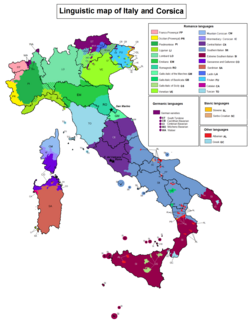Napolitaans
| Napolitaans nnapulitano | ||
|---|---|---|
| Gepraat in: | ||
| Gebied: | Suid-Europa | |
| Totale sprekers: | 7 000 000[1] | |
| Rang: | 75-85 | |
| Taalfamilie: | Indo-Europees Italies Romaans Wes-Romaans Italoromaans Napolitaans | |
| Skrifstelsel: | Latynse alfabet | |
| Amptelike status | ||
| Amptelike taal in: | ||
| Gereguleer deur: | geen | |
| Taalkodes | ||
| ISO 639-1: | geen | |
| ISO 639-2: | Nap | |
| ISO 639-3: | nap | |

| ||
| Nota: Hierdie bladsy kan IFA fonetiese simbole in Unicode bevat. | ||
Napolitaans (nnapulitano) is 'n Romaanse taal, verwant aan Italiaans.
Napolitaans ( 'o nnapulitano or napulitano) word nie alleen in en rondom Napels gepraat nie, maar ook in 'n groot deel van die res van Suid-Italië, veral in Kampanië, Basilicata en noordelike Kalabrië.
Daar is wel 'n debat of daar sprake daarvan is of dit 'n Italiaanse dialek is, of 'n selfstandige taal. Die verskille met Italiaans is dermate groot, dat 'n Noord-Italianer met moeite Napolitaans kan verstaan.
Uitspraak
Die uitspraak van Napolitaans is moeiliker as Italiaans, veral omdat klinkers dikwels toonloos uitgespreek word, en woorde aan mekaar uitgespreek word wat verandering van medeklinkers kan veroorsaak.
Byvoorbeeld:
'o Sole mio - o 'soole'mieje (en nie: o solee miejo nie)
Verwysings
| Indo-Europese tale: Kentum-tale: Italiese tale | ||
|---|---|---|
| Italiese groep | Oskies | Umbries | Faliskies | Latyn | |
| Romaanse tale | ||
| Iberoromaans | Aragonees | Asturies | Galicies | Katalaans | Ladino | Leonees | Portugees | Spaans | |
| Galloromaans | Langues d'oil: Frans | Gallo | Lorreins | Normandies (Auregnais | Guernésiais | Jèrriais | Sercquiais) Pikardies | Champenois | Waals | Anglo-Normandies Oksitaans: Aranees | Auvergnat | Gaskons | Languedokies | Limousin | Provensaals Frankoprovensaals | |
| Galloitalies | Lombardies | Monegaskies | Piëmontees | Venesiaans | |
| Retoromaans | Romansch | Ladinies | Friulaans | |
| Italoromaans | Dalmaties | Italiaans | Napolitaans | |
| Suid-Romaans | Korsikaans | Sardies (Campidanies, Galluraans, Logudories, Sassaries) | Sisiliaans | |
| Balkanromaans | Aroemeens | Istro-Roemaans | Meglenoroemaans | Roemeens | |
| Romaanse Kunstale |
Interlingua | Interlingue | Lingua Franca Nova | |
Text is available under the CC BY-SA 4.0 license; additional terms may apply.
Images, videos and audio are available under their respective licenses.

